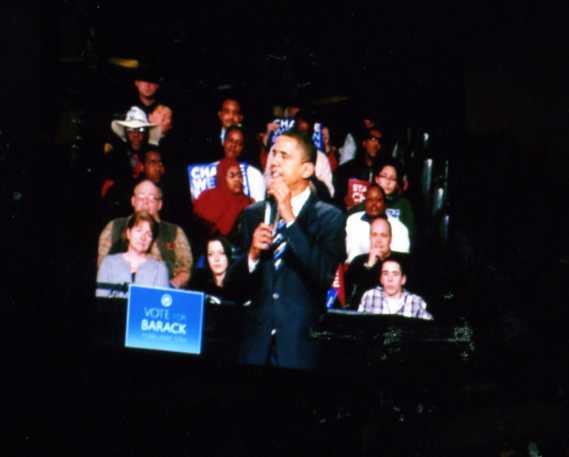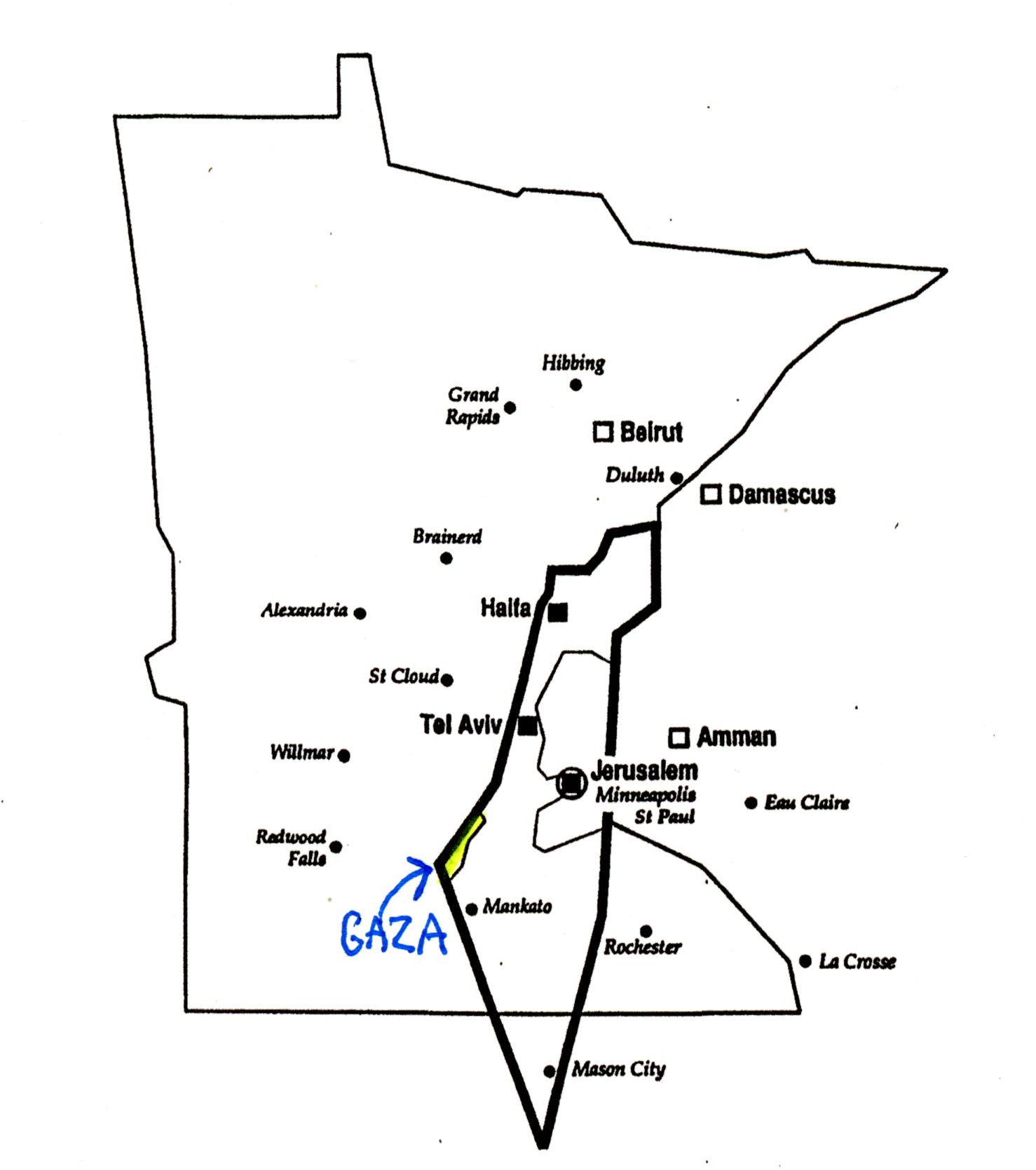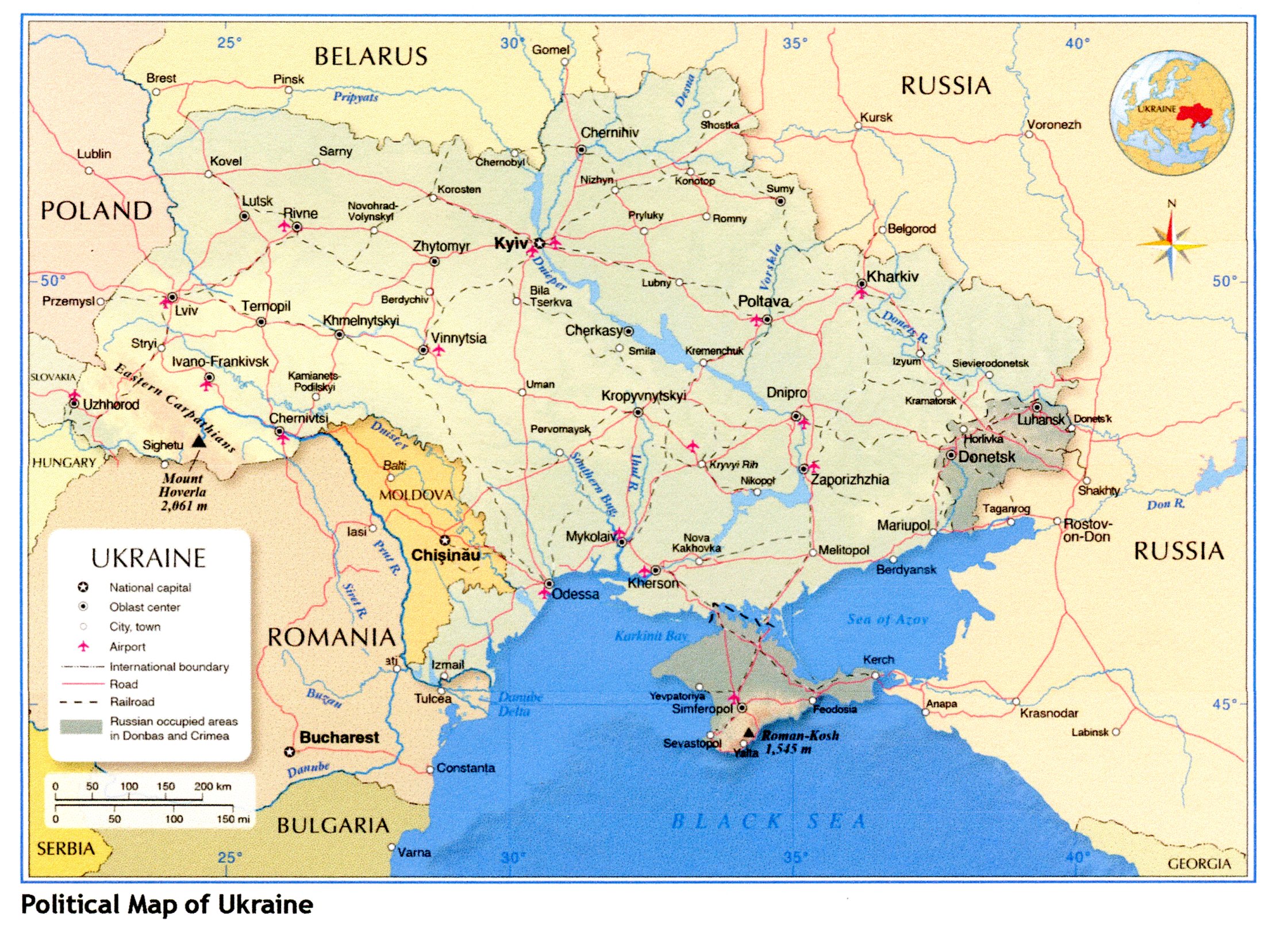ELECTION INFORMATION: Minnesota related; and National information. My position on 2024 election, here.
Today, Tuesday, October 1, is the Vice-Presidential debate. It is also the 100th birthday of Jimmy Carter, 39th President of the United States.
I am a Tim Walz and Jimmy Carter supporter. I’ve also lived in Minnesota for 60 years, and my entire life has been in/or closely associated with public education. A column in Sundays Minnesota Star Tribune is where I’d like to start: Minnesota Star Tribune Walz Sep 29 2024.
The debate will speak for itself. I want to reflect on my Governor, and Vice-Presidential candidate Tim Walz; and on Jimmy Carter, one of my favorite Presidents…and a bit of history, too.

TIM WALZ: The Vice-Presidency, in all of American history thus far, has been a very consequential position, quite possibly never more so than this year .
I was surprised when Kamala Harris announced Gov. Walz as her running mate a couple of months ago. I thought she would go with one of the other presumed candidates from a so-called “battleground” state. My feeling had nothing to do with Mr. Walz’s qualities or potential, which I have always seen as excellent. He brought to his selection a dozen years in the U.S. Congress representing a “Red” District, and is in his second term as Governor of my state, which tends to liberal, but whose rural areas usually vote conservative (60% of Minnesotans 5.7 million people live in the Twin Cities metropolitan area).
I met Walz in person a single time, at a fund-raiser, during his first campaign in 2006. Eight times since then he has won election to Congress or Governor.
Minnesota is a state that works, and a lot of that is due to community minded leadership of Governor Walz and a strong and effective Democratic Party (DFL). The word “community” is my key word. By no means, does this mean that all is perfect here. No place is perfect. But Minnesotans work well together, and there is a very strong sense of community. We experience this in person every day.
Recently Dane Smith wrote a commentary published in the Minnesota Star Tribune about our state. You can read it here: Minnesota Star Tribune Dane Smith Sep 2024. It is a summary of an entire series written by him in 2023, accessible in its entirety here. Smith, a native of Texas, describes Minnesota well, I feel.
We have tended to elect leaders who bring out the best in us, and Governor Walz is the latest. I’m proud of him, and I would say most of us share this view – you don’t get elected 8 times without recognized positive qualities.
Recent Vice-Presidents: President Joe Biden (President 2021- ) served as Vice-President (2009-2017). Here are some other vice-presidents in my lifetime: Harry Truman (President 1945-53) became Vice-President just months before Franklin Roosevelt died in April, 1945; Richard Nixon (President 1969-74) was Vice-President 1953-61; Lyndon Johnson (President 1963-69) was V.P 1961-63; Hubert Humphrey (V.P. 1965-69); Nelson Rockefeller (V.P 1974-77); Walter Mondale (V.P. 1977-81); George H.W. Bush (President 1989-93) also served as Vice-President (1981-89).
All of these came to office with extensive public service backgrounds.
President Carter elevated the stature of the Vice-Presidency when he was elected President in 1977. In his personal memoir of his life, “A Full Life” (link below), he devotes two full pages to this important decision (pp. 111-113). Later, his Vice-President, Walter Mondale, made his own run for President in 1984, and selected Geraldine Ferraro as the first female nominee for Vice-President.
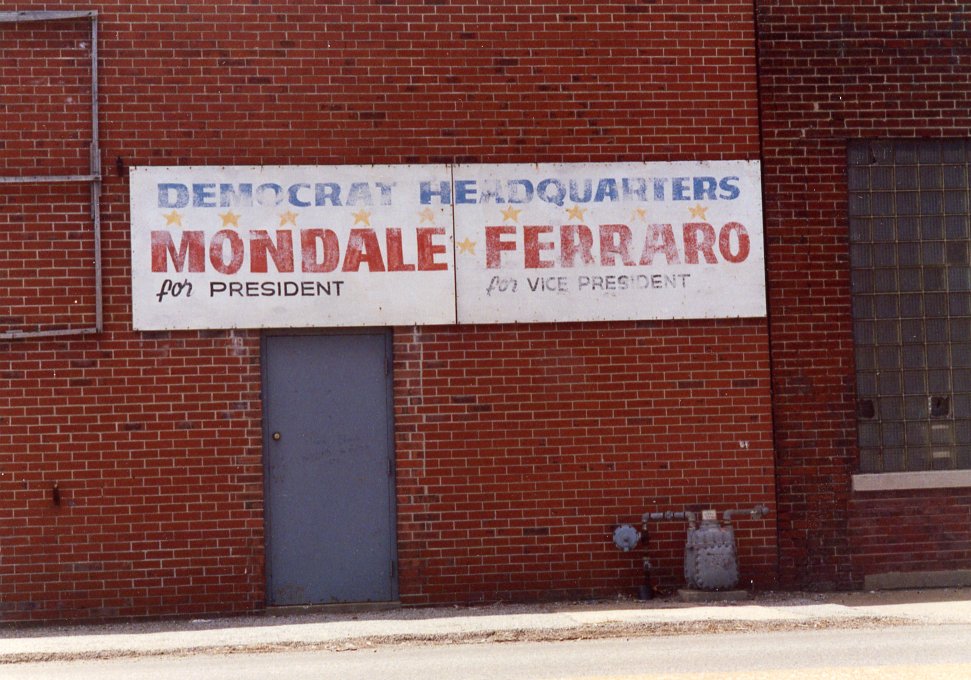
ca 1990, East St. Louis IL.
Gerald Ford (1974-77, then House of Representatives Minority Leader), replaced Spiro Agnew when he resigned as vice-president, and then replaced Richard Nixon when he resigned the presidency. Other V.P.’s post-Harry Truman: Dan Quayle (1989-93), Al Gore (1993-2001), Dick Cheney (2001-09).
Former vice-presidents have had very substantial records of public service before their election. Tim Walz’s opponent, J.D. Vance, has less than two years of public service experience as U.S. Senator from Ohio. Dig a tiny bit deeper and Vance is a very scary guy, especially when coupled with his ideology and his patrons.
Mike Pence? (V.P. 2017-21) has. of course, a particular kind of experience to relate. He wasn’t asked and/or wouldn’t accept a reprise of the four years as Vice-President, and is not on the ballot again.
Particularly beginning with Walter Mondale, the vice-presidency has more often been given an important and substantive role, for good reason. The vice-presidency is important, particularly in this ever more complex world we share.
In her very interesting book “An Unfinished Love Story“, Doris Kearns Goodwin recalls a memorable speech by President Lyndon Johnson to the Nation March 15, 1965. It was a Civil Rights speech for the ages. Doris recalled a conversation with her to-be husband, Dick Goodwin, who was one of Johnson’s primary speech writers: “I told Dick that I had read an account that when Johnson was later asked who had written the speech, he pulled out a photo of his twenty-year-old self surrounded by a cluster of Mexican American kids , his former students at Cotulla, Texas. “They did,” (p. 234)
LBJ had a hard-nose reputation as a government leader, but he genuinely had a soft heart for those less advantaged, and it showed in the landmark legislation passed under his leadership in the 1960s.
Tim Walz is the kind of leader in the most positive mold of those who came before. When the chips are down, as they are in every administration, he will be equal to the task.
Few of the people listed above came from privilege and entitlement. All of them experienced what Harry Truman called “The Buck Stops Here” weight of responsibility that comes with governing. Knowing what I know of Tim Walz, he will be a very worthy member of the vice-presidential club. If/When the crisis comes, such as Hurricane Helene, you want a steady experienced hand at the wheel. Tim Walz is ready.
*
JIMMY CARTER: Mr. Carter is the first President to reach 100. In my opinion, he will go down in history as one of the most consequential of Presidents. I’ve been an unabashed supporter of President Carter and his work since I first learned of him in the mid-1970s.
Enroute to Florida in 1977 I stopped in Plains, Georgia, to at least see the tiny town from which he came. Plains was then and remains small town America.
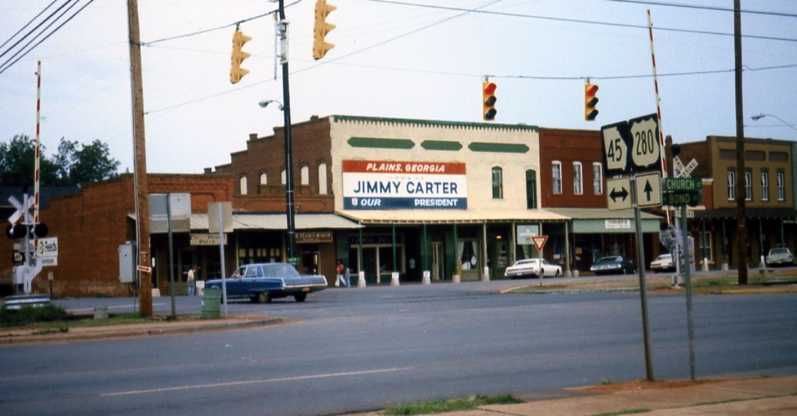
Plains GA June, 1977
I recently read Jimmy Carter’s personal memoir, “A Full Life, Reflections at Ninety“. It is a very readable 238 pages, and as anyone who knows Carter knows, the four years of his presidency are only a tiny part of his life experience and immense contributions to the community that is our planet.
Of course, Carter gets around to things like growing up, and peanut farming, and life as a Naval officer on a nuclear submarine, and the role of the Carter Center et al. Rosalynn was his partner in all ways during their very long marriage.
Together, Jimmy and Rosalynn gave a huge boost to Habitat for Humanity.
He devotes 61 pages, in his own homespun and very clear way, to “Issues mostly resolved” and “Problems still pending” by the end of his term as President of the U.S.
At page 111, he deals with the issue of Truth in politics when he ran for higher office, in part: “Having served as a legislator and governor, I knew how difficult it was to keep this promise [to tell my audiences the truth]…I decided to make the commitment….”
Even in my own much more limited personal experience representing people, I know that it is impossible, truly inadvisable, to always be completely honest. At the same time, there are discernible boundaries between acceptable truth and unacceptable lies in a civil society, lines which are constantly and excessively crossed in contemporary political discourse.
It was my privilege to see Jimmy Carter in person in Minneapolis in 2015, in his 90th year. It was a very special privilege. I wrote briefly about his participation then, here. Unfortunately, a link to the video of his talk is no longer available. The entire conference had an emphasis on human rights.
*
POSTNOTES:
There have been two other unrelated posts this past week. If you wish: here (Moms Demand Action) and here (Conspicuous Consumption – musing about the latest Tesla).
Regarding tonight: my most serious concerns, truly, are the implications of J.D. Vance and Project 2025. I will write about these a little later. These are the ‘nuclear bombs’ in our midst – aimed at our republic and our democracy.
from Robert Reich overnight: here
from Heather Cox Richardson, also overnight: here
10:15 p.m. Oct. 1, 2024: I watched the entire debate. It was well worth the time. Joyce Vance sent her observations about the same time I wrote my sentence. You can read her comments here. (Joyce is no relation to J.D., to my knowledge). Note from Larry: Walz did fine tonight.
Personal opinion: the purpose of the debates was more for political usefulness than substantive contributions. In this age of sophisticated media, the importance is the sound bite or video bit that can be useful in political ads and the like. We will see the results in the next weeks.
COMMENTS (more at end of post):
from Laura: Thanks very much, Dick. Of course I’ve already voted and I’m certainly working for Harris and Walz!
from Gary: Dick, thanks for sharing.
from Brian: Thanks so much for the update/info on Walz. Good to know. And from your area!
from Carole: Thank you. DC is awash with planned watch parties all across the city.
POSTNOTE Oct 8, 2024: The Minnesota Star Tribune On October 6 had a full-page commentary entitled “Is Minnesota in trouble?”. The column appeared to be a counterpoint to the Dane Smith column referred to above. Because of its length and small and difficult to read font size, I enlarged and cut and pasted the contents into this five-page reprint of the entire column. MN Star Tribune Mn in trouble? 10 6 24. I present it solely as a different perspective on a state which, in my opinion, clearly works pretty well.
As I say near the beginning of this post a week ago: “Minnesota is a state that works, and a lot of that is due to community minded leadership of Governor Walz and a strong and effective Democratic Party (DFL). The word “community” is my key word. By no means, does this mean that all is perfect here. No place is perfect. But Minnesotans work well together, and there is a very strong sense of community. We experience this in person every day.”





